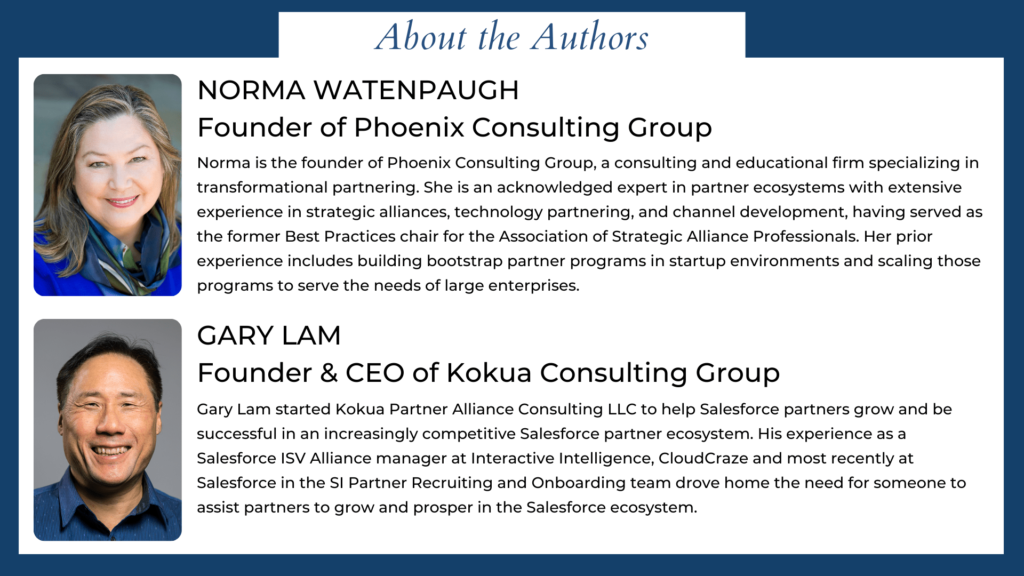 Welcome back to our Partner Readiness series, where Gary Lam and I share actionable insights to help you develop your partner program.
Welcome back to our Partner Readiness series, where Gary Lam and I share actionable insights to help you develop your partner program.
In the previous article, we discussed the importance of creating a repeatable sales model. This makes it a perfect segue for our next topic: Lighthouse reference Accounts. What are they? Why do you need them? And how to create them? Keep reading to learn more.
In this article, we will discuss:
- What a reference account is
- Why do you need one or two or more
- And how to secure reference accounts
What is a reference account?
As we previously discussed, creating a repeatable sales model for your practice is extremely important. Partners want to be assured that there is a market of customers seeking your product. The ultimate proof is indeed, having customers. Most importantly, customers who can potentially serve as references.
A reference account is an early user who can attest to the added value and benefits of your product. They can be your ambassador. Someone hesitant prospects can talk to and confirm that you can deliver as promised.
Why do you need a reference account?
Now you might be wondering, “why do I specifically need a reference account? I have so many testimonials from my clients.”.
Well, reference accounts are not to be confused with testimonials. Yes, you need to strive to deliver the best quality service you possibly can. And yes, you should be able to call on your customers to provide you with positive feedback and testimonials with no problem whatsoever.
However, reference accounts are much more than that. They have the power to move your practice forward and expand your market opportunities. Here is why you need a reference account:
Establishing your business lighthouse
Very much as a lighthouse, reference accounts are the first users who light the way forward for your business. As you meet with potential clients and discuss partnering with prospects, they will ask you for proof. They need to know that your product is not only legitimate but that there have been other clients who’ve trusted you with their business and that you did deliver as promised.
In this case, a testimonial or endorsement on your LinkedIn profile will not do. They will ask to speak to your previous clients. That is why you need to have your reference account briefed and ready.
Ensuring proof of product
Reference accounts can also serve as proof of product. This is extremely relevant for start-ups that are rolling out a Minimum Viable Product (MVP). Demos may not be sufficient to pitch your idea. There needs to be concrete proof of product, someone who can attest that you indeed have a viable product that delivers on its promise. That is where your reference accounts come into play.
They can be key to securing more customers and assuring partners that your product indeed has value and that there is a market for it.
How to secure reference accounts?
Now that we’ve established the importance of having reference accounts, let’s dive into how you actually secure them.
In an ideal world, and with unlimited resources, you would have a significant list of reference accounts. Even some big-shot name logos. But beyond all of that, what you most importantly need is a handful of customers that are willing to endorse your products. Here are three strategies you can implement to secure your first reference accounts:
- Understanding their psychology
From my experience, and for the early entrepreneurs, this often turns into what I like to call the “chicken and egg proposition.” How do you get the first customer? Who would be willing to take the risk of trying out a new and perhaps unproven product? Believe it or not, there is a bit of psychology and behavioral tendencies that go into finding your first few customers. They are often Early Adopters in Chasm-speak (raise your hand if you’ve read Geoffrey Moore’s book Crossing the Chasm).
These early adopters tend to gravitate towards new and innovative products. They like to be the first or maybe second kid on the block to get the new cool thing. Early adopters are comfortable with taking a bit of risk to try a new product that delivers on said benefits, and they like to brag about it.
- The warm puppy approach
Have you ever adopted a puppy before? What if you were told that you can take the puppy home for free, and if you don’t like him, you can just bring him back. Do you know what will happen then? You won’t bring him back because you will inevitably fall in love with the puppy.
How does this relate to referral accounts you ask? Well, the warm puppy approach is one that you can implement in acquiring your first “lighthouse”. The point is that your customer will fall in love with your product and happily agree to be a reference account. Their amazing experience with you will entice them to share it with any prospects who call them to verify the legitimacy of your company.
- Ensure the references are still positive
This is a strategy that has more to do with ensuring the longevity of your reference accounts as opposed to acquiring them.
You see, listing customer logos on your website or on your sales deck while doing a demo is an efficient way to showcase social proof. Especially when there are some high-profile logos on there, but ask yourself this: when was the last time you communicated with those clients? Are you sure they are still viable reference accounts? Do they still perceive their experience with you as positive?
Earlier this year, I was helping a client evaluate some channel software, and the ISV provided us with a few reference accounts. When we contacted one of them, the feedback we got was far from what the ISV would have wished for. The reference account was unhappy with the software solution and was already considering replacing it. Care to guess what happened next? Indeed, my client did not close the deal with that software company and moved on to another one.
Moral of the story: Call your reference accounts! When asked for references, I myself have made a habit to always call them beforehand each and every time to:
- a) Ask their permission to give out their contact info
- b) Ensure that they still have positive thoughts about recommending my services.
Plus, it’s just good practice to keep in touch with your best customers. It often results in repeat business.
Final thoughts
So now tell me, how many reference accounts do you have? How many of your previous clients would be willing to attest to your products? These are the questions you should be asking yourself today to ensure the longevity of your business. As an ISV partner, you simply cannot overlook the importance of reference accounts; the market opportunities they help you solidify are undeniable.




